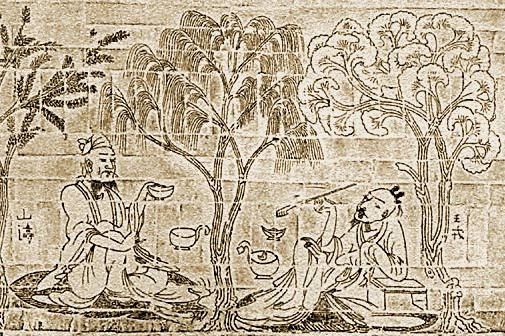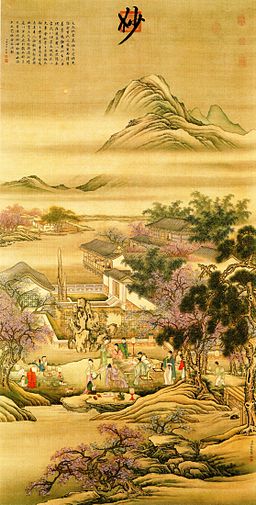The paradoxical search for drunkenness with the beers from cereals.
The Liezi ensures that a man falling drunk from his chariot will not be harmed, for his vital power is total. The Shenxian zhuan speaks of a Taoist, Kong Yuan fang, who drank one beer sheng per meal, that is to say one litre. Elsewhere a Taoist cannot become celestial immortal because of his love for beer, but does not become less earthly immortal. At the age of five hundred he had the face of a teenager. Other biographies in the same collection point out that certain drugs provide tolerance to alcohol[1].
The Taoist ban on Cereals does not extend to beer.
Xi Kang (or Ji Kang, 223-262) becomes a practising Taoist, author of a " Dissertation on the Nourishment of the Vital Principle ". Rich, from an excellent family, related by his wife to the imperial family, Xi Kang receives at his home his friends Ruan Ji, Xiang Xiu, Ruan Xian, Wang Rong, Liu Ling and Shan Tao, all writers and poets with whom he forms the Club of the 7 Wise Men of the Bamboo Forest. According to the memories of one of them, they walk around chatting in a small bamboo grove, stop to drink beer, resume their walk, then after drinking, chatting, composing verses, they go to the tavern of a certain Mr. Huang where they get drunk. Ruan Ji, also a musician, is reputed to have created the melody jiu-kang ( 酒狂, litt. "Extasy of Drunkenness" or "Beer Craze") played with the guqin, a seven-stringed musical instrument.
Lisen to Jiukuang and look at the musical score.
What did educated, cultured, poetic and deeply religious people like Xi Kang expect from drunkenness? Here is one of the answers in the "Song of the Virtue of Beer" composed by Liu Ling (221-300). The poet ignores the etiquette, the tight morals and the narrow-mindedness of the officials:
….
A glided
and a dormant scholar,
heard about my reputation,
set out to denounce me.
They run to me with their chests swelled and sleeves rolled;
with bulging eyes and trembling lips,
give me a verbiage of rites and rules.
I myself, however,
hold up my keg and dipper,
Sipping my beer, playing my beard
and sitting with my feet facing the pair,
as I listen to their raging snarl.
Ha, with my qu-mold pillow and lee-mash cushion,
I spoiled myself into seraphic sensation !
I am as carefree as a man can be.
…
"The "pillow of (qu) ferments" (qu = small dried rice or millet loaves covered with amylolytic mould) and the " cushion of spent grains (dregs)" are two clear allusions to the making of beer. Chinese poets drank beer, not wine.
A poem from Xi Kang from the series Jiuhui (Beer Meetings), shows what the poet was looking for in the beer. The initial and triumphant intoxication makes him perceive the harmony of everything he sees and hears. Then depression invades him, when he regrets not being able to pursue a simple and hidden life.
What a pleasure to walk in the garden !
I go around the infinity ;
All plants emit perfumes ...
The trees of the forest mingle confusedly ;
In the Xuanchi pond frolic the breams and carps;
With light bullets I shoot birds in flight,
With a thin line I take sturgeon.
During the session occurs a delicious singing
The various breaths are arranged in the same tune.
The neighboring creek offered me a pure beer,
A whispered song comes out the white teeth;
My idle lute stirs and plays beautifully,
A pure tone arises, following the wind.
Why this meeting makes me not so happy ?
For I regret that Dongyezi is not here.
In beer, I am thinking to the man who is hiding,
Keeping ancient customs;
Seven strings of the lute are sufficient to him,
He puts his heart to know himself.
It is assumed that rice beer (chou jiu ) and glutinous millet beer (bai jiu ) were the food base of Li Bai (701-762) towards the end of his life, when he had since long overcame the ordeal of grains abstinence. Close to death, he composed this epitaph for Chow Hsuan, a brewer of Xuancheng who lived now in the legendary realm of the dead, the Yellow Springs :
Epitaph to old Ji, talentuous brewer at Xuancheng.
eh! old Ji, at Yellow Sources,
you are still brewing your "Old Spring" [2].
At night on the terrace, now without Li Bai,
to whom do you sell your beer ?
[1] Lévi Jean 1983, L'abstinence des céréales chez les taoïstes, Études chinoises n°1, p. 10 n. 13.
[2] "Old Spring" (lao chun) is a famous beer brewed with spring rice and probably kept and aged long enough.




